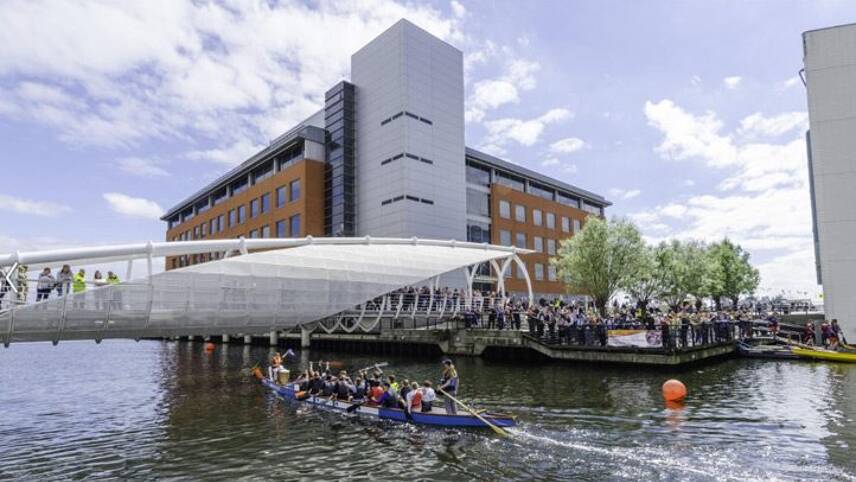Register for free and continue reading
Join our growing army of changemakers and get unlimited access to our premium content

Pictured: Liverpool Waters’ Princes Dock. Image: Peel L&P
Managed by Peel L&P, the portfolio of office properties includes MediaCityUK’s The Vic, The Alex, Quay West and the Digital World Centre; TraffordCity’s The Venus and Liverpool Waters’ Princes Dock.
Peel L&P’s head office at the Trafford Centre, which is managed by property developer into, has also been certified as net-zero.
The firm has achieved net-zero standard by building to BREEAM standards in the first instance, investing heavily in energy efficiency and offsetting remaining emissions through a scheme planting trees in North West England.
It achieved BREEAM communities standard for its MediaCityUK developments in 2011; gained ISO 5001 certification in 2015 and, in 2019, invested £859,000 in energy efficiency measures. Peel L&P estimates this investment will reduce the annual emissions footprint of its office tenants by 13% collectively.
Peel L&P’s sustainability director Jo Holden said the company will re-assess each of the newly verified buildings annually and strive to increase the number of net-zero buildings in its portfolio.
The certification for the Greater-Manchester-based offices has been met with much praise, given that the local authority for the city-region is aiming for all new buildings erected to be net-zero by 2028. The Greater Manchester Combined Authority (GMCA) believes this deadline is crucial to its ability to deliver overarching carbon neutrality by 2038 – 12 years ahead of the UK’s national target.
“If we are to deliver on our carbon neutral commitment for 2038, published in our five-year environment plan, we need to urgently make deep cuts in emissions from our building stock,” Greater Manchester’s Mayor Andy Burnham said.
“Peel L&P have shown that those deep cuts are not only possible, they’re also good for business. The message to others now is pretty clear: no excuses, if Peel L&P can pull this off, then so can you.”
Net-zero neighbourhood
In related news, Neath Port Talbot council has, within the past month, granted planning permission for the construction of a new net-zero housing development comprising 35 properties.
Submitted by developer Sero Homes, the plans detail how the development will generate more renewable energy than it consumes through onsite solar, and how this clean energy will be stored onsite using battery storage arrays. Ground-source heat pumps and heat recovery systems will be used to further minimize energy-related emissions across the development.
When electricity is imported to the development, Sero said, software will be used to ensure that related emissions are more than balanced by those avoided from electricity generated on the site and exported from the homes. The developer is confident that this model will bring about household energy bills of “near-zero” for residents.
A tweet cannot begin to explain this development, a World first. #NetZeroCarbon Active energy management and an inner park for residents. The houses also aggregate as a mini renewable power station for when the grid needs it. Our thanks to @WelshGovernment for its support. https://t.co/Rl4VRtB1of
— Dr. David Williams 🏴 (@davideco2) December 23, 2019
Sero has set a completion date of 2021 for the £8m venture, which is being part-funded through the Welsh government’s Innovative Housing Programme. Once completed, the homes – 11 of which are two-bed, 22 of which are three-bed and two of which are four-bed – will be available through long-term tenures.
The approval of the project comes shortly after the Government unveiled its vision for the Future Homes Standard – a policy framework bolstering requirements for sustainability measures such as triple glazing, buildings fabrics that limit heat loss, low-carbon heating systems and onsite generation for housebuilders.
However, given that the Conservative Government previously axed legislation which would have ensured all housing build after 2016 would meet zero-carbon standards, concerns remain around the ambitiousness of the new policy framework. The Committee on Climate Change (CCC) has repeatedly warned that policy and business action on low-carbon housing has not been rapid enough in recent years to meet the UK’s initial Climate Change Act commitments – let alone its more ambitious net-zero target.
Sarah George


Please login or Register to leave a comment.